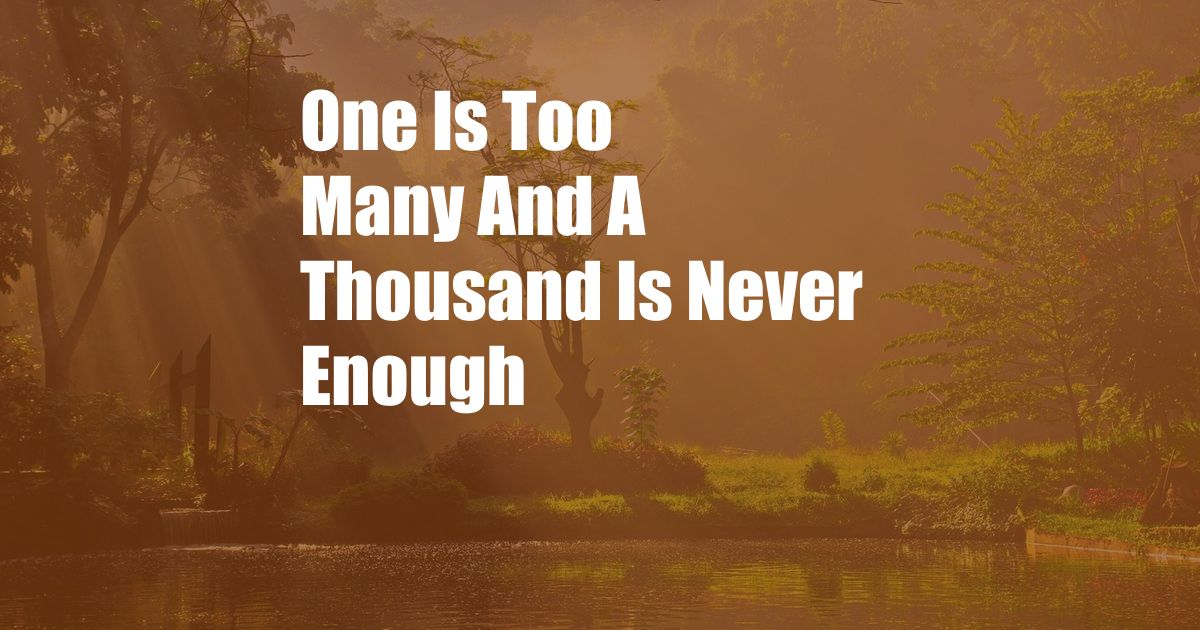
One is Too Many and a Thousand is Never Enough
One evening, I found myself in a crowded bar, surrounded by a sea of faces. As I scanned the room, my eyes fell upon a solitary figure sitting at the corner of the bar. He was nursing a drink, his gaze lost in the distance. An air of loneliness hung about him that I couldn’t shake. As I watched him, I couldn’t help but wonder about his story. Was he lost in the crowd or simply lost within himself? In that moment, I was struck by the realization that even in the midst of a multitude, we can still feel isolated and alone.
This experience sparked a deep reflection within me about the nature of human connection. We are social creatures, hardwired for relationships and a sense of belonging. Yet, in our modern world, we often find ourselves disconnected from one another, lost in our own virtual worlds or consumed by the endless demands of daily life. It’s a paradox of our time: we have more ways to connect with each other than ever before, yet we’re also more isolated than ever before.
The Loneliness Epidemic
The World Health Organization has declared loneliness a global epidemic, with studies showing that it has significant negative impacts on both physical and mental health. Loneliness has been linked to an increased risk of cardiovascular disease, stroke, dementia, and depression. It has also been associated with lower life expectancy and a reduced quality of life.
The causes of loneliness are complex and multifaceted. They include factors such as social isolation, lack of meaningful relationships, and the breakdown of traditional community structures. In our increasingly atomized society, we often find ourselves living in anonymity, with few real connections to our neighbors or communities.
Understanding the Difference between Loneliness and Solitude
It’s important to distinguish between loneliness and solitude. Loneliness is a negative state of mind that arises from a perceived lack of social connection. It is often accompanied by feelings of isolation, emptiness, and sadness. Solitude, on the other hand, is a positive state of being that is characterized by a voluntary withdrawal from social interaction. It is often sought out by people who need time to reflect, recharge, or pursue creative activities.
Solitude can be a valuable tool for personal growth and well-being. It allows us to connect with our inner selves, explore our thoughts and feelings, and develop a deeper sense of self-awareness. However, it’s important to balance solitude with social connection. Too much solitude can lead to loneliness, while too little solitude can lead to burnout and overwhelm.
Overcoming Loneliness
If you’re feeling lonely, there are a number of things you can do to overcome it. Some helpful tips include:
- Reach out to friends and family. Make an effort to connect with the people you care about, even if it’s just for a short phone call or a quick coffee date.
- Join a social group or activity. There are many different groups and activities available for people who want to meet new people and make friends. Check your local community center, library, or online social media groups for events and activities that interest you.
- Volunteer your time. Volunteering is a great way to give back to your community and meet new people who share your interests.
- Seek professional help. If you’re struggling to overcome loneliness on your own, don’t hesitate to reach out to a therapist or counselor for help. They can provide support and guidance as you work through your loneliness and develop coping mechanisms.
Remember, loneliness is a common experience, and you’re not alone in feeling this way. With a little effort, you can overcome loneliness and build a stronger sense of connection with others.
FAQs about Loneliness
Q: Is loneliness a sign of weakness?
A: No, loneliness is not a sign of weakness. It is a common human experience that can affect anyone, regardless of their age, gender, or circumstances.
Q: Can loneliness be prevented?
A: There is no surefire way to prevent loneliness, but there are things you can do to reduce your risk of feeling lonely. These include: building strong relationships, getting involved in social activities, and volunteering your time.
Q: Is loneliness a mental illness?
A: Loneliness is not a mental illness, but it can be a symptom of certain mental illnesses, such as depression and anxiety. If you’re concerned that you may be experiencing symptoms of a mental illness, please seek professional help.
Conclusion
In the end, the question of “one is too many and a thousand is never enough” is a question about the human condition. We are social creatures who need connection and belonging. Yet, we also need solitude and time for ourselves. The key is to find a balance between the two. Too much of one can lead to loneliness, while too much of the other can lead to isolation. By understanding the difference between loneliness and solitude, and by taking steps to overcome loneliness, we can build stronger relationships, live more fulfilling lives, and create a more connected world.
Are you interested in learning more about loneliness? Check out these resources: